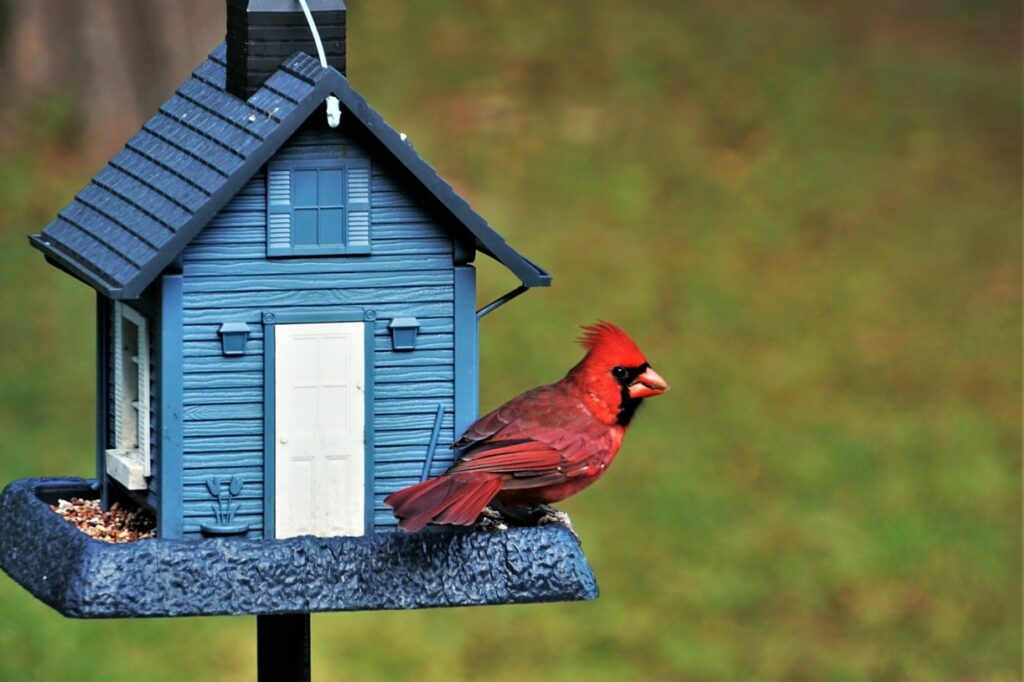Cardinals are known among bird enthusiasts primarily thanks to their distinctive short, conical bill and conspicuous crest. Moreover, male cardinals have beautiful reddish plumage which distinguishes them from other species.
But, above all, bird enthusiasts are probably fond of cardinals, northern cardinals precisely, because they’re often seen in huge flocks of thousands of birds foraging and exploring the bird feeders homeowners set for them.
However, what concerns us today are the following questions: Do cardinals eat mealworms? And if they do, will they?
Cardinals will definitely enjoy a mealworm meal! They’re not picky eaters so they’ll probably eat the mealworms you’re planning to add for them.
If you want to learn more, keep reading, as we’ve got some curious details about the topic!

Will Cardinals Eat Mealworms?
A cardinal’s diet usually consists of fruits, grains, and seeds. Sometimes, however, they feed on insects and invertebrates.
Mealworms are the larval form of a type of beetle, and as such, they can be part of a cardinal’s diet
The thing is, cardinals rarely catch mealworms in the wild, which is why grains, fruits, and seeds make the most of their diet. They’re just much easier to find!
That’s why cardinals usually don’t even bother looking for mealworms – why spend the energy looking for something when you can take advantage of what’s already there?
Therefore, setting a mealworm bird feeder for the cardinals in your area will do them a tremendous favor!
Can Baby Cardinals Eat Mealworms?
Baby cardinals can eat mealworms, although their digestive system will find it easier to digest live mealworms rather than dried ones. In fact, studies have shown that some young cardinals have a diet consisting almost exclusively of insects!
Why Are Mealworms Good For Cardinals?
Live mealworms contain 2% fiber, 13% fat, and 20% protein. Moreover, they cover 62% moisture. Their nutritional content isn’t as high as that of other food sources, but they can make for a tasty treat for cardinals.
Many bird enthusiasts cover them with nutritional powder designated for the requirements of the species they’re feeding.
There’s a common misconception that mealworms will harm cardinals and birds in general, but you can rest assured that they are safe for cardinals as long as the birds have grown up in the wild and do not suffer from other severe health issues.
Do Cardinals Eat Dried Mealworms?
Compared to live mealworms, the dried ones have a higher protein, fat, and fiber content (53%, 28%, and 6%, respectively).
Despite the fact that many people believe dried mealworms can cause birds to become severely dehydrated, this is only a myth.
Indeed, dried mealworms have a much lower moisture percentage – only 5% – but cardinals are quite capable of finding water sources in the wild.
In short, as humans and other animals do, cardinals feel when they’re thirsty and will hydrate if needed. Dehydration could be a problem only if their diet consists of dried mealworms and nothing else.
As such, cardinals can definitely eat dried mealworms, and they’ll enjoy some if they’re available.
Should You Soak Dried Mealworms for Cardinals?
Soaking dried mealworms before feeding them to the cardinals in or around your yard isn’t mandatory. However, if you want to go the extra mile for these beautiful creatures, you can undoubtedly do so!
Soaking them in water for around 30 minutes is an excellent way to offer the birds an extra source of water.
Can You Install Mealworm Feeders to Attract Cardinals?
You can definitely install a mealworm feeder in your yard to attract cardinals and other birds as well. You can choose among the multiple options on the market, although we recommend an enclosed mealworm bird feeder, as it will keep them fresh.
However, before choosing a product, ensure it’s suitable for what you’re planning to feed the birds – live or dried mealworms.
Most of the products on the market are designed for dried mealworms, especially the items that aren’t enclosed – naturally, live mealworms could crawl their way out of the feeder and make a mess in your yard.
Besides, if you decide on installing a mealworm feeder, make sure to provide your cardinals with other required food sources as well, such as seeds and fruits. As we’ve already established, a diet consisting almost exclusively of mealworms isn’t nutritious enough for cardinals.
